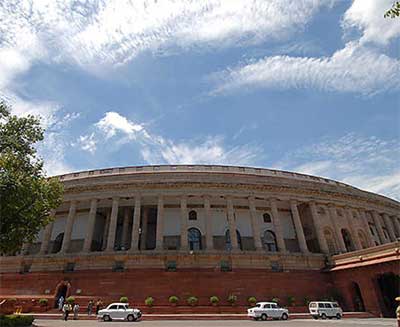Relevance: GS-2: Indian Constitution—Historical Underpinnings, Evolution, Features, Amendments, Significant Provisions and Basic Structure; Separation of Powers between various organs; Parliament and State Legislatures—Structure, Functioning, Conduct of Business, Powers & Privileges and Issues Arising out of these
Key Phrases: Article 98, need for an independent secretariat; an effective functioning parliamentary democracy, promoting the senior-most secretary; Article 312; constitutional and statutory responsibilities; holding the executive accountable.
Why in News?
- Recently, Dr. P.P.K. Ramacharyulu has been appointed as the Secretary-General of the Upper House.
- He was the first-ever Rajya Sabha secretariat staff member who rose to become the Secretary-General of the Upper House.
Role of Secretariat and Secretary-General (SG)
- In the discharge of his constitutional and statutory responsibilities, the Chairman, Rajya Sabha is assisted by the Secretary-General, who holds the rank of the Cabinet Secretary to the Government of India.
- The Secretary-General, in turn, is assisted by senior functionaries at the level of Secretary, Additional Secretary, Joint Secretary and other officers and staff of the Secretariat
- The Rajya Sabha Secretariat functions under the overall guidance and control of the Chairman, Rajya Sabha
- The SG is the third most key functionary of the Rajya Sabha after the Chairman and the Deputy Chairman
- He also enjoys certain privileges such as
- Freedom from arrest,
- Immunity from criminal proceedings, and
- Any obstruction and breach of their rights would amount to contempt of the House
Key Highlights
History of appointment of Secretary-General (SG) of Rajya Sabha
- A precedent - appointing the Secretary-General from ‘outside’ or
bureaucracy, often retired — very hard to unfollow was made possible
by the Chairman.
- Hence appointment of Dr. Ramacharyulu was both
- A well-deserving signal for long-serving staff of the Parliament secretariat and
- Course correction to restore the legitimacy of their long-time demand.
- Hence appointment of Dr. Ramacharyulu was both
- However, it was a fleeting gesture — Ramacharyulu was replaced, bizarrely, by a former bureaucrat, P.C. Mody, in less than three months.
- Since the first Parliament in 1952, 11 SGs had served in the
Rajya Sabha before Ramacharyulu.
- Except for some of the lateral entry staff, who could become Secretaries-General, all the others were parachuted from the civil services or other services from time to time.
- In the first Parliament, the Rajya Sabha opted for the first
Secretary (General) S.N. Mukherjee, a civil servant, despite India
having a legacy of the Legislative Assembly Department (Secretariat)
attached to the Central Legislative Assembly since 1929.
- However, his appointment could be justified as he had served in the Constituent Assembly Secretariat as Joint Secretary and as chief draftsman of the Constitution.
- Since 1993, all the Secretaries-General of the Rajya Sabha
were from the civil service till the appointment of Ramacharyulu as the
12th Secretary-General.
- The appointment of P.C. Mody, a retired IRS officer as the 13th Secretary-General in the Upper House was for the first time.
Independence of the executive
- Article 98 of the Constitution provides the scope of separate secretariats for the two Houses of Parliament.
- The principle, hence, laid in the Article is that the secretariats should be independent of the executive government.
- In the Constituent Assembly, R.K. Sidhwa, an eminent member,
emphasised the need for an independent secretariat.
- He cited an illustration: “When the Speaker’s secretariat wanted pencils for the members, the executive refused to give them.”.
- A separate secretariat marks a feature of a functioning parliamentary democracy.
Necessity of having someone as SG from the ‘inside’
- The post demands unfailing knowledge and vast experience of parliamentary procedures, practices and precedents.
- Most of the civil servants lack this aspect of expertise.
In the Lok Sabha
- Unlike the Rajya Sabha, the Lok Sabha had nine of its staff (including the lateral-entry officers) raised to become Secretaries-General to date.
- The first Secretary (General) of the Lok Sabha, M.N. Kaul (1952-64), was Secretary to the Constituent Assembly Secretariat (1947-50) and the Provisional Parliament (1950-52).
- The precedent of promoting the senior-most secretary to the post of Secretary-General of the Lok Sabha has met with pause and resume.
- Also, some of them got the Secretary-General position after their retirement.
Constituting a breach
Dilution of Separation of Power as a principle
- Serving civil servants or those who are retired come with long-held baggage and the clout of their past career.
- When civil servants are hired to the post of Secretary-General,
- This dishonours the purpose of ensuring the independence of the Secretariat
- Leads to a conflict of interests.
- It breaches the principle of separation of power.
- The officials mandated with exercising one area of power may not expect to exercise the others.
Role of Parliament
- In a parliamentary polity, Parliament is supposed to watch over the executive’s administrative behaviour.
- Parliament has all the reasons for its surveillance of administration.
- Parliament must have the technical and human resource competency
that is on a par with the executive to be an effective body for providing
meaningful scrutiny and to make the executive accountable.
- Supreme Court has its own administration and maintenance of staff to ensure Separation of Power
- A strong Parliament means a more answerable executive
- Which is diluted because bureaucracy persistently does not allow Parliament to be a competent and robust legislative institution.
An all-India service is a must
- There are many f legislative bodies in India, the panchayat, block panchayat, zila parishad, municipal corporations to State legislatures and Union Parliament at the national level.
- These lack their own common public recruiting and training agency at the national level.
- Parliament and State legislative secretariats recruit their pool of bureaucrats separately.
- Ensuring competent and robust legislative institutions demands having qualified and well-trained staff in place.
- Creating a common all-India service cadre — an Indian Legislative
Service — is a must.
- A common service can build a combined and experienced legislative staff cadre, enabling them to serve from across local bodies to Union Parliament.
- The Rajya Sabha can, under Article 312, pass a resolution to this effect, in national interest, to create an all-India service common to both the Union and the States, and enables Parliament to create such a service by law.
Conclusion
- In the United Kingdom, the Clerk of the House of Commons has always been appointed from the legislative staff pool created to serve Parliament. It is high time that India adaptted and adopted such democratic institutional practices.
Source: The Hindu
Mains Question:
Q. Explaining the role of Secretary General of Rajya Sabha, highlight the need for an independent Indian Legislative Service.



















